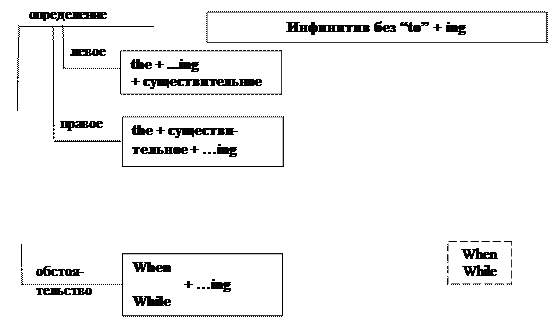

Мы поможем в написании ваших работ!
ЗНАЕТЕ ЛИ ВЫ?
|
Перевод герундия с предлогами
|
| При, при помощи, посредством + существительное
или деепричастие
He achieved these results by raising temperature.
Он достиг этих результатов при повышении (повышая) температуры.
| |
|
| |
| По, после + существительное или деепричастие совершенного вида.
On returning home he began translating the text.
Возвратившись домой (по возвращении домой), он начал переводить текст.
| |
|
| |
| При + существительное или деепричастие
In translating the text he used the dictionary.
При переводе (переводя) текста он пользовался словарем.
| |
|
| |
| Без + существительное или отрицательная форма деепричастия.
We understood the article without translating it.
Мы поняли статью, не переводя (без перевода) её.
|
| 1. On reading the article he decided to translate it into Russian.
2. Many specialists have taken part in producing the first sputniks.
3. You can master English by reading books and newspapers every day.
4. By doing nothing we learn nothing.
5. She left room without saying a word.
6. We spend energy in lifting an object.
7. As it was late she went away without waiting for me.
8. Upon making a number of experiments atomic physicists solved the problem of building a very powerful microscope.
9. On carrying on one of his experiments Faraday discovered electromagnetic induction.
10. The teacher asked her students not to go away without speaking to her.
11. In changing water into ice its composition is not changed.
12. By studying and experimenting man came to know the structure of matter.
13. Science cannot be studied without experimenting.
| to wait for – ожидать;
composition – состав
|
Перевод герундиальных оборотов

|
|
| Переводится, как правило, придаточными предложениями, подлежащее которых соответствует притяжательному местоимению или существительному в притяжательном падеже, а сказуемое – герундию этого оборота. Выбор типа придаточного предложения при переводе зависит от того, каким членом предложения является герундий.
| 1. Герундий подлежащее:
I. P. Pavlov’shaving devoted his life to the progress of science is known to everybody.
То, что Павлов посвятил свою жизнь развитию науки, известно всем.
2. Герундий дополнение:
We know of hisstudying English.
Мы знаем, что он (о том, что он) изучает английский язык.
3. Герундий обстоятельство:
Due to copperbeing a good conductor of electricity it is widely used in industry.
Благодаря тому, что медь является хорошим проводником электричества, она широко используется в промышленности.
| 1. His being invited to take part in this conference is natural as everybody knows of his having made a great number of experiments in physics.
2. The engineer told us about his having beeninvited to that research institute.
3. The engineer’s having constructed a new type of the device was not known to us.
4. In spite of the semiconductor diodes being so important they were little used at the beginning of the century.
5. The term “semiconductor” has been chosen because of its occupying an intermediate place between metals and insulators.
6. His being sent to Moscow was very important for his work.
7. We all know of their designing a new type of semiconductor radio-set.
8. Our engineer’s taking part in the development of the new programming system was of great help to us.
9. The Curies’ having discovered radium gave them the possibility of discovering other radioactive elements.
10. After the young scientist’s report having been discussed at the conference it was published in a scientific journal.
| to invite – приглашать;
semiconductor – полупроводник
in spite of …– несмотря на то, что…;
to choose (chose, chosen) – выбирать;
occupy – занимать;
intermediate – промежуточный;
insulator – изолятор
|
PARTICIPLE
| | VOICE
| | ACTIVE
| PASIIVE
| | PARTICIPLE I
| asking
| being asked
| | PARTICIPLE II
| –
| asked
| | PERFECT PARTICIPLE
| having asked
| having been asked
|
  Функции PARTICIPLE I ACTIVE VOICE и способы перевода Функции PARTICIPLE I ACTIVE VOICE и способы перевода
|
| Переводится:
|
| |
| Причастием на
-щий(ся), -вший
| The reading student is my friend.
Читающий студент – мой друг.
| |
|
|
| |
| 1. Причастным оборотом.
2. Определитель-ным придаточ-ным предложе-нием
| A molecule is a compound consisting of two or more atoms.
1. Молекула – это вещество, состоящее из двух или более атомов.
2. Молекула – это вещество, которое состоит из двух или более атомов.
| |
|
|
| |
| 1. Деепричастием
на -я, -в
2. Обстоятельст-венными прида- точными пред-ложениями.
3. Существитель-ными с предло-гом при
| Working at the laboratory he made many experiments.
1. Работая в лаборатории, он провел много экспериментов.
2. Когда он работал в лаборатории, он провел много экспериментов.
3. При работе в лаборатории он провел много экспериментов
|
| 1. People living one hundred years ago knew nothing of radio.
2. The engineer testing the device is a good specialist.
3. While orbiting the Earth the first experimental space station was functioning perfectly well.
4. The man standing at the window lectures physics.
5. You can find these data in the table hanging on the wall.
6. When working with electricity one must be very careful.
7. Studying at school he was interested in physics very much.
8. The figures following show the dependence of the rate of reaction on temperature.
| perfectly – очень;
careful – осторожный;
rate – скорость;
dependence – зависимость;
substance – вещество
|
|





 Функции PARTICIPLE I ACTIVE VOICE и способы перевода
Функции PARTICIPLE I ACTIVE VOICE и способы перевода


